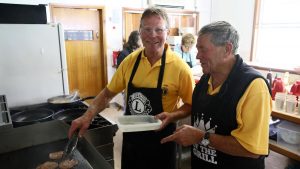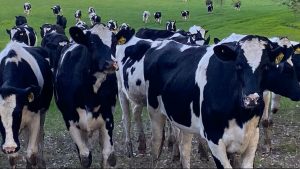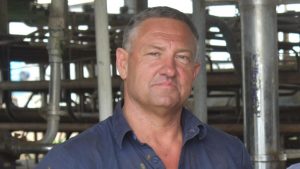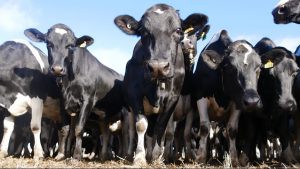
Add to that, the personal stories of grief, isolation, relationship breakdowns, accidents and serious illness, and it is understandable why so many farmers battle with their mental health and well-being.
Sallie Jones is a dairy farmer and mental health advocate and says 8.6 Australians die every day by suicide.
“That’s more than double the road toll,” she said
“Seventy-seven per cent of those who take their life are male.
“Beyond the tragic loss of the person, the impact of suicide death is felt by 135 people.”
After losing her own dairy-farming father to suicide during the 2016 dairy crisis, Ms Jones channelled her grief into creating Gippsland Jersey, with the agenda of paying farmers a fair price for their milk.
On a mission to create social change for rural mental health, in 2018 she created a calendar called Farming Conversations: Tales of strength and resilience from Gippsland Dairy Farmers.
The calendar shared the personal struggle of a dairy farmer each month in an effort to trigger an open mental health conversation.
Now in its fifth edition, the calendar has shared the stories of 61 farmers — roughly 10 per cent of dairy farmers across the region — and has provided the foundation for an online support network within the dairy farming community.
“I’m so encouraged that mental health conversations come a lot easier these days,” Ms Jones said.
“Gippsland Jersey wants to be a part of the prevention and we believe that storytelling is the first step.”

Personal stories, shared experiences
Warragul dairy farmer Joe Maggeto struggled with suicidality for a year before his brother reached out to him, and eventually the police, during an episode of prolonged distress.
He normalised people having mental health struggles and how stress and trauma can trigger suicidal thoughts and feelings.
“At the end of the day, we think about suicide when you’re struggling – I still think about it,” he said.
Mr Maggeto said with the right support the feelings would pass.
“To get to where I am now, I struggle, but I’m managing it,” he said.
Now a mental health advocate and confidant for fellow farmers, Mr Maggeto praised this year’s calendar contributors for essentially making themselves available for conversations with other struggling farmers.
“Whenever I hear there’s 12 new people for the calendar, I always feel a little sad spot, because we continue to find these people that are struggling,” he said.
Timeout from farming can help
After battling bouts of depression since he was 28, Marlo dairy farmer Chris “Sugar” Kane now brings more balance into his life by taking time out from work to play football and spend more time with his family.
“There’s that much that goes on in running a business,” he said.
“I’ve had people from 20 years old to 80 years old that I’ve spoken to about it. It’s just unbelievable how many people actually suffer from it.”
Mr Kane suggests talking through problems, ideas and solutions with friends, family and fellow farmers.
He also says it can be helpful to make a concerted effort to take timeout from the farm to get perspective.
Likewise, Woodside dairy farmer Darcy McAlpine has found participating in recreational sport and debriefing with friends important for diffusing stress.
“I spend a lot of time talking on the phone, talking to close friends. So not much stays on my mind for long,” he said.
“It comes out pretty quickly and you deal with things a lot better when you’re open and honest.”
Mr McAlpine said labour shortages had become the most compelling issue for smaller dairy operations and encouraged farmers to set realistic goals and pace themselves.
“Probably one of the biggest things I’ve learnt, is that it’s OK if you don’t get it done today,” he said.
“There’s always tomorrow.”
Getting respite a must
Self-care by monitoring one’s own fatigue limits and burnout patterns is a familiar scenario for Tinamba dairy farmer Peter Caldwell, who has found comfort in falling asleep in front of the TV or radio.
“Some days I just get that tired, you feel as though you’re getting a bit run down,” he said.
“I just have to go and have a 20-minute nap in the afternoon.”
Mr Caldwell said the constant demands of running the farm meant it was a seven-day-a-week job and he had to grab the extra sleep where he could.
“Being seven days, you don’t get a day off, so sometimes you just have to do that,” he said.
After losing his wife of 44 years, Mr Caldwell had found it particularly difficult not having someone to talk through problems with.
He said he found great comfort in the support of his family, and since taking his grandson on as an apprentice.
‘Reset, take your mind off it’
Nineteen years ago, Carrajung South dairy farmer Matt Willis at the age of 21 sustained injuries from a driving accident that left him an incomplete quadriplegic.
He overcame tremendous odds and has been able to walk again as well as contend with fire, drought and family illness.
When he’s having a bad day, is feeling overwhelmed or having difficulties with his legs, Mr Willis finds it helpful to remember that “this time will pass”.
“You’ve got to sit back, reset, sit down, go for a drive somewhere down the back paddock,” he said.
“Change your job, do whatever you have to do to reset and take your mind off it.
“You’ve just got to change what you’re doing.”
Putting on the kettle
With limited accessible mental health support in rural areas and no government funding for a roaming “on-the-ground counsellor”, Ms Jones said it was up to farmers to check in with each other.
“People need people,” she said.
“We are all so busy, people are so burnt out that they feel that they don’t have any time to call in and say g’day to a person.
“I think we need to go back and figure out well what is a priority.”
Instead of relying on the government or organisations to provide solutions to poor mental health, Ms Jones suggests supporting each other more at a community level was the answer.
“The solution is about all of us looking over the back fence, or the people within our community and our network, to just look out for each other, just be good humans,” she said.
“Drop in, don’t turn away, have a cuppa. Cups of tea over the kitchen table; they’re timeless, they still work.”

























